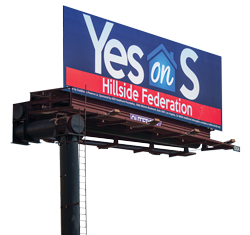Katy Perry wins property battle with nuns
“I am the champion, and you’re gonna hear me roar,” Katy Perry croons in one of her most famous pop songs. But who knew the she’d be the victor in a drawn-out fight with a group of L.A. nuns?
In March, a judge ruled that the singer could close on a $14.5 million Los Feliz convent, clearing the way for her to convert it into her personal residence.
The ruling ends a two-year battle between Perry and the Catholic nuns — the Sisters of the Immaculate Heart of the Blessed Virgin Mary, led by Sisters Rita Callanan and Catherine Rose Holzman — over the sale of the eight-acre property.
In 2015, Perry moved to purchase the property from the Archdiocese of Los Angeles, which claimed full ownership of the site. But Callanan and Holzman claimed that they were instead the rightful owners of the property and were in talks to sell it to local restaurateur Dana Hollister.
A bitter fight followed, with several of the nuns accusing Perry of witchcraft and the archdiocese taking legal action to challenge Hollister’s claim.
Los Angeles Superior Court Judge Stephanie Bowick ruled that the nuns did not have the authority to sell the property to Hollister.
“Even assuming that the Sisters had the authority to dispose of the property, which they did not, they nevertheless failed to validly consummate the transaction,” Bowick wrote.
Trouble between the spreadsheets?
Douglas Emmett, a Santa Monica-based landlord known for paying top dollar and holding assets long-term, has outbid East Coast bigwigs like Boston Properties for a trophy tower in the city where it is headquartered. The company is in contract to purchase the Wilshire Palisades building at 1299 Ocean Avenue for about $287 million, or $1,400 a square foot. If the deal to purchase the office tower from Blackstone Group closes, it would be the highest per-square-foot sale price in Santa Monica’s history.
But despite a steady flow of top-dollar investment trades in recent months, it’s not all rainbows and tech unicorns in L.A.’s office market. Amid the good tidings of dropping vacancies extolled in fourth-quarter market reports is a growing number of vacant sublease spaces. In fact, sublease space availability has not been this high in six years, according to Transwestern.
“At year-end 2016, there was approximately 4.1 million square feet of office space available for sublease, which was a 9 percent increase from year-end 2015 and up 42 percent from year-end 2014,” said Michael Soto, a research manager at Transwestern.
Volatile startups are also a major factor in sublease availability, as companies quickly expand and contract. Nasty Gal’s 50,000-square-foot space in the PacMutual building, for example, was seen as a watershed moment for Downtown L.A. But the clothing company has put up 14,600 square feet of that space for sublease since it filed for Chapter 11 bankruptcy in November 2016.
Sublease growth could be a harbinger of a slowing office market in 2018 and 2019 — about the time 2.2 million square feet of office construction comes online in Greater L.A., said Eric Kenas of Cushman & Wakefield.
 Voters reject anti-development measure
Voters reject anti-development measure
NIMBYism runs deep in Los Angeles, a sprawling metropolis grappling with increasing density. So developers and housing advocates were concerned when a controversial anti-development proposal went to a vote last month.
The initiative, known as Measure S, would have halted most development in the city for two years while city officials updated zoning rules.
They needn’t have worried — the measure failed by a wide margin, despite predictions that it would be a close call.
Opponents of the measure said that by shooting down Measure S, voters averted a catastrophe in L.A.’s already tight housing market.
“I’m unbelievably relieved,” said Los Angeles City Council President Herb Wesson at the “No on S” campaign’s late-night party at the L.A. Hotel, which broke into celebration when the “Yes” campaign officially conceded minutes before midnight.
Campaigns for and against the measure spent a total of more than $13 million, ethics filings show.
